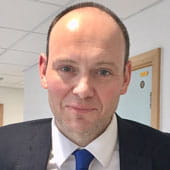Staying away from those you love the most saves lives

15 Apr 2020
Mr David Whitehead
Mr David Whitehead is a Consultant Ear, Nose & Throat Surgeon at the James Cook University Hospital in Middlesbrough. In this week’s blog series ‘COVID-19: views from the NHS frontline,’ he describes a week when he was on call, providing emergency ENT surgery to patients suspected of having COVID-19. He developed symptoms and tested positive for COVID-19. He has now recovered and is back at work in the NHS.
I began my week on call in the North East of England on Friday 20 March 2020. Things were moving fast - we thought we would have a few weeks before treating patients with COVID-19, compared to colleagues in London. In fact, I saw at least five patients who were suspected of having the Coronavirus that week.
A fissure revealed itself within our department by the Monday morning around the discrepancy between Government guidelines and ENT UK guidance [Public Health England (PHE) has since updated its guidelines and they align with ENT UK’s] on the Personal Protective Equipment (PPE) we should wear when treating patients suspected of having COVID-19]. An impromptu meeting arranged by a colleague ensued, and by the end it was decided that we would wear full PPE, including FFP3 mask and full-face shield or visor, to manage any patient suspected of having COVID-19. This is because our work involved examining a patient’s airway and could potentially be an aerosol generating procedure. Unexpectedly, I became a trust expert in the use of our dedicated ‘COVID theatre’. We used this to treat all patients who required emergency surgery and who were suspected of having, or had COVID-19.
Among the emergency cases I treated that week, was a patient who had been assaulted and had a serious, life-threatening neck injury. They were also suspected of having COVID-19. Another patient required a temporary tracheostomy - which involved creating an opening in their neck in order to place a tube directly into their windpipe to help them breathe. This patient was also suspected of having COVID-19. A number of other critically unwell patients were also taken to theatre.
Treating patients with COVID-19 pushed frontline staff to the limit. Throughout the operations, my colleagues and I wore the full PPE, which was challenging for everyone. It’s hot, heavy and claustrophobic. It’s also restrictive and difficult to communicate while wearing the equipment. The mask is not custom-fitted so it’s uncomfortable to wear. Surgery also takes longer in this environment as everyone is unfamiliar with the processes. We realised after surgery, during our debriefings, that we could improve communication by writing our names with a black marker pen across our visors. This helped greatly.
At the end of my week on call, my father telephoned to say that my mother had just been offered a place in a nursing home. She has survived five strokes but has lost 98% of her speech. She was admitted just before the nursing home shut itself off from the outside world and sadly I didn’t get to see her. She can communicate in non-verbal ways but, of course, that is challenging when a phone is the main form of communication with residents and video calls are not routine.
On the day she was admitted to the nursing home, I visited my father. Standing outside my parents’ house, looking at my father, a frail, retired ENT surgeon some 5 meters away, I explained: “I cannot come in Dad”. I felt fine but was petrified about potentially passing anything onto him. My sister was there and was looking after him. She made me a cup of tea. We chatted at a distance, outside in the sunshine. My sister and I agreed that I had better keep the tea cup to reduce the risk of me potentially transmitting anything.
I took a photo of my father and sister, standing at the front door and then drove away. It felt very odd not entering the house I knew so well, and not being able to hug, or kiss my father on the cheek, before I left.
Later that day, I developed a cough. I sent a text to my maxillofacial colleague who had recently had COVID-19.
“Did it start with a cough? Just a little one?”
“Yes,” he replied.
“Hmm,” I thought.
Overnight, I developed a high temperature and went on to have a headache like nothing I had experienced before. I subsequently tested positive for COVID-19 and have now recovered. I have felt very lethargic and among other symptoms, for a period of time I completely lost all sense of smell.
I had a premonition just before my week on call that I was going to catch COVID-19. As a surgeon my ethos was to serve the public to the best of my ability and to provide hope when others may have lost theirs.
I don’t feel animosity towards anyone, this is life and naturally it is imperfect. I feel dreadful for the families that have lost loved ones, families that have lost nurses and doctors in this struggle. Not everyone is designed to put others before themselves. It’s difficult to articulate how this comes about in a professional career. I agree with Boris Johnson’s sentiment that it’s a love for life that relentlessly powers the NHS.
Hopefully, my story reinforces how important it is for the medical profession and public to stay away from their vulnerable relatives, however hard that it is. I cannot help thinking how dreadful the consequences would have been had I not kept my distance from my father that day. We all have a responsibility to prevent the spread of this virus and to protect the most vulnerable in society – even if it means staying away from the people we love.
This blog is from our series COVID-19: views from the NHS frontline. If you would like to write a blog for us, please contact content@rcseng.ac.uk.
